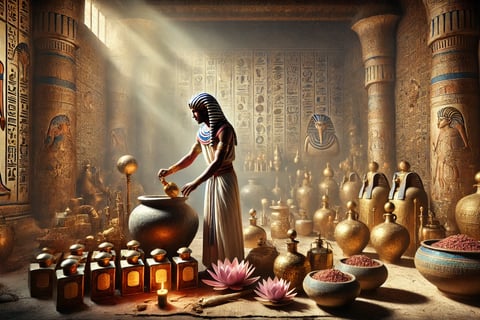Mystical Aromas: Essential Oils in Ancient Rituals and Remedies
Andy
5/14/20253 min read
Essential oils have a rich history that dates back thousands of years, playing significant roles in various cultures for their therapeutic, medicinal, and aromatic properties. From ancient Egypt to the Roman Empire, these concentrated plant extracts have been revered not just for their fragrances but also for their healing capabilities. This blog post takes you on a historical journey through the use of essential oils in ancient times, exploring their significance in different civilizations.
Ancient Egypt: The Birthplace of Aromatherapy
The use of essential oils can be traced back to ancient Egypt, where they were integral to religious rituals, beauty regimens, and medicinal practices. Egyptians extracted oils from plants like frankincense, myrrh, and cedarwood, using them in perfumes, incense, and balms. These oils were believed to connect the living with the divine and played a crucial role in the mummification process, preserving bodies for the afterlife.
Key Uses:
Religious Rituals: Oils like frankincense were burned as offerings to gods, believed to purify the air and elevate spiritual consciousness.
Cosmetics and Perfumes: Essential oils were used in beauty preparations, with Cleopatra famously using rose and jasmine to maintain her allure.
Medicine: Oils were applied to wounds and used in treatments for various ailments, showcasing an early understanding of their therapeutic properties.
Ancient China: A Holistic Approach
In ancient China, essential oils were incorporated into Traditional Chinese Medicine (TCM), where they were used to balance the body's energy, known as "Qi." Oils were extracted from herbs, flowers, and trees, with a focus on their healing properties and ability to restore harmony within the body.
Key Uses:
Healing Practices: Essential oils were used alongside acupuncture and herbal medicine to treat physical and emotional imbalances.
Spiritual Practices: Aromatic plants were burned in rituals to cleanse spaces and promote mental clarity.
Ancient Greece: The Philosophers and Healers
The ancient Greeks adopted many of the aromatic practices of the Egyptians and developed their own understanding of essential oils. Renowned philosophers like Hippocrates and Galen recognized the medicinal properties of these oils, using them to treat various ailments.
Key Uses:
Medicinal Applications: Oils were used to heal wounds, alleviate pain, and improve overall health, with specific oils assigned to specific conditions.
Culinary Uses: Greeks incorporated essential oils like oregano and thyme into their cooking, recognizing their health benefits.
The Roman Empire: Expansion and Innovation
The Romans further popularized the use of essential oils, spreading their knowledge across Europe as they conquered new territories. They utilized oils for hygiene, medicine, and leisure, significantly influencing the culture of the time.
Key Uses:
Bathing and Hygiene: Romans added essential oils to their baths for relaxation and therapeutic benefits, leading to the establishment of public baths.
Aromatherapy and Massage: Oils were used in massage and healing treatments, promoting relaxation and physical well-being.
Perfumes: The art of perfumery flourished, with essential oils from various regions blended to create complex fragrances.
Ancient India: Spiritual and Medicinal Use
In ancient India, essential oils were integral to Ayurvedic medicine, a holistic system that emphasized balance and well-being. Oils were extracted from various plants and used for both medicinal and spiritual purposes.
Key Uses:
Ayurvedic Treatments: Oils like sandalwood and turmeric were used for their anti-inflammatory and antiseptic properties.
Spiritual Practices: Essential oils were used in rituals and meditation practices to enhance spiritual awareness and create sacred spaces.
Conclusion: The Enduring Legacy of Essential Oils
The use of essential oils in ancient times reflects a deep understanding of nature and its healing properties. From the sacred rituals of ancient Egypt to the holistic practices of Ayurveda, these oils have been a vital part of human history, transcending cultures and time. Today, essential oils continue to be celebrated for their aromatic and therapeutic benefits, proving that the wisdom of the ancients remains relevant in our modern lives.
As we explore the historical significance of essential oils, we honor the traditions that have shaped their use and continue to benefit from their remarkable properties. Whether through aromatherapy, personal care, or natural healing, essential oils remain a cherished part of our wellness journey.

